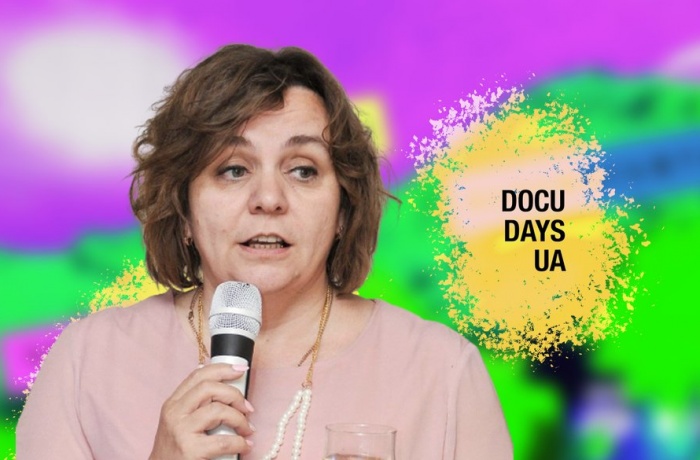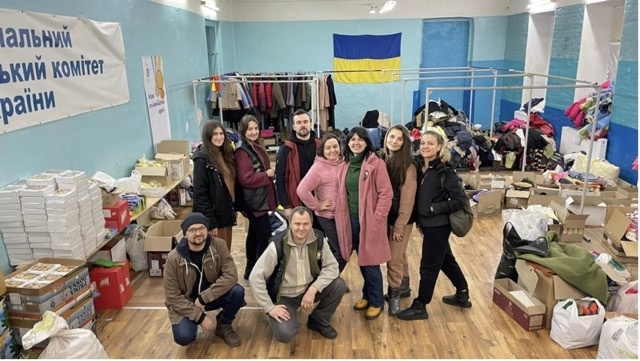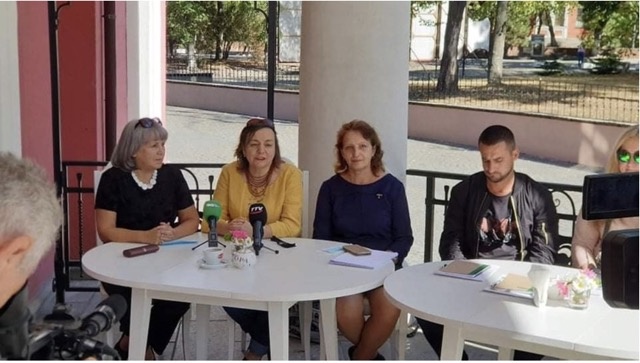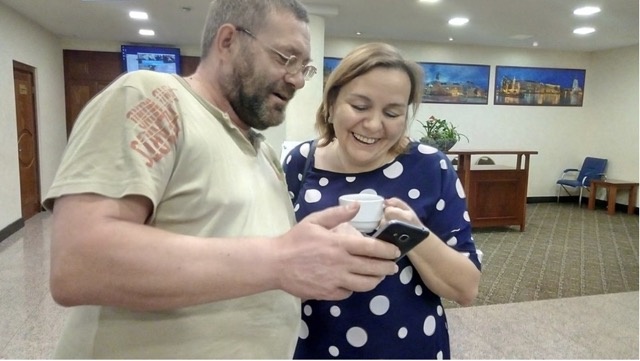Inha Dudnik: “Docudays UA allows us to explain complex things in simple words”
Inha Dudnik: “Docudays UA allows us to explain complex things in simple words”

What helps Ukrainians to stop tanks with their bare hands? To fundraise millions for Bayraktar drones? The Travelling Docudays UA and Suspilne Culture have prepared ten stories about the resilience of Ukrainians which will help us find answers to these questions.
This is a conversation with Inha Dudnik, the Executive Director of NGO Territory of Success and a regional coordinator of the Docudays UA International Human Rights Documentary Film Festival in Kirovohrad Region. Inha has been working with NGO Docudays since 2009. She lives and works in Kropyvnytskyi.
HOW IT BEGAN
It was 2008. I was studying at the Human Rights School. One of the experts was a well-known human rights advocate, co-founder of the Docudays UA festival Volodymyr Yavorskyi. He told us about the Travelling Festival and said that we could participate in it. My team immediately applied, and in 2009 we launched our own Travelling Festival. We started hosting screenings together with the Children’s Environmental NGO Flora (a regional partner of Docudays UA in Kirovohrad Region). Our organisation worked at penitentiary institutions, prisons. And Flora organised open screenings and screenings at education institutions.
TALENT FOR MODERATION
I really like unusual methods of presenting information. And cinema is an opportunity to use discussions of characters, stories of specific people as a way to talk about universal human problems and discuss unusual topics which people usually do not dare to breach, or they think that they don’t have the time to do it. And after watching a film people are more honest during discussions because they are not talking about their personal story but about a character, but it is still a discussion of their own stories and problems. Some discussions can be very heated.
I remember that in 2018, the festival’s topic was Equal Equalities, and it was difficult to moderate the screenings. Because viewers have different opinions about equality, sometimes polar opposites, and occasionally even antagonistic views. I as a moderator found it hard to keep the balance in discussions. It was hard to hold back, not to express my own position on certain issues, not to engage in the discussion. It was a challenge for me, but I was very curious if I could manage it or not. I feel like I was successful. Later I met acquaintances who attended the screening, and they said that the discussion made them think about phenomena they didn't notice or accept before. Docudays UA allows us to explain complex things with simple words.

Photo from Inha Dudnik’s personal archive
We worked at penitentiary institutions, the audience there is very difficult. At first I was wary of moderating on my own, so I invited my colleague Oleksandr Bukalov (head of NGO Donetsk Memorial, Docudays UA regional coordinator in Donetsk Region). Because he had already had extensive experience of working with inmates by that time. It seemed to me that I would not manage it, and for some time I was an observer. One time it just so happened that I had to moderate a discussion on my own. People are different, they respond to films differently, but if the prison staff is not around, it is much easier to get them to talk, and a conversation about important things proves to be honest and very necessary for them. But prison staff have ambiguous reactions to documentaries and discussions about them. When you start talking about human rights, not inmate rights specifically but about the philosophy of human rights in general, the workers of these institutions almost everywhere start asking right away: “But why you’re only talking about their rights, why are you silent about our rights?” It doesn’t occur to them that human rights are the same for everyone, both for inmates and for the staff. They start complaining that nobody takes care of them, their rights are violated. At this point I have to explain that they can take care of themselves, that they should talk out loud and write to their bosses about their problems and needs. I offer them help, explain to them how they can begin restoring their rights, what tools the state offers for this, but this work needs to be done together. And at this point they all become quiet for some reason and avert their gaze…
NEW HORIZONS AND DREAMS
I also had an interesting experience when we took the festival to towns and villages. At first we were shocked: there are villages just 30 km from the city where 300 people live without internet, cell connection, the post office is closed, the store works 2 days per week, and if it snows or rains, then these people are just cut off from civilization. Nobody there has ever even heard about human rights. And then suddenly a film is brought to them, and they can discuss their problems after the screening, too.
They are very eager to come to screenings. It is an event for them, they will be discussing the film for another month or two! Some communities opened their own Docudays UA film clubs after our events. Many want to join the DOCU/CLUB Network, but they need methodological and expert support. I have a dream to have all 49 communities of Kirovohrad Region become independent Docudays UA partners.

Photo from Inha Dudnik’s personal archive
24 FEBRUARY…
Until the last moment I didn’t believe that a full-scale war would start, even though I listened to all the news, read experts and analysts. I thought there would be sabre-rattling, fearmongering, and they would stop at that. I had so much work to do, we were finishing a project, we had to make our deadlines. And I was working until 3 a.m. At 6 a.m. a friend calls me and asks, “Do you have a plan B?” I don’t understand anything, what plan B, I don’t even have a plan A, what is she talking about? And then she yells: “Kyiv is being bombed!” My first thought was about my kids, one of my daughters lived in Kropyvnytskyi with her husband, and the other lived with her family in Boryspil. I call the ones in Boryspil, they say they plan to leave. Now my daughter is in Poland with her kids, my son-in-law is at the front. The daughter who lived in Kropyvnytskyi proposed to go to the west of Ukraine, but I wasn’t ready… All my relatives refused to leave the city.
Meanwhile my daughter and my son-in-law signed up for the Territorial Defence. They guarded Kropyvnytskyi for a few months, then they were dispatched to the East. And they both died there in battle. So young, they were both 31… Olia was very talented, she was studying to be a designer… It’s hard for me to talk about those days. Mothers whose children have died at the front know what a hellish pain it is and how hard it is to learn to live with this pain… Live and continue to work.
HELPING THE DISPLACED
At 9 a.m. our entire team was at the office. We moved all the documents, lists of event participants, servers, we couldn’t allow this information to end up in enemy hands. We thought about what we should do now. We agreed to take care of our families and be in touch.
And I went to the volunteer military centre. There were already enough people there who did not know what to do but really wanted to help. We started weaving camouflage nets. We wrote an announcement with a list of what the military needed, and the next day we were already receiving aid. Everyone was doing everything, so many people, nobody was responsible for anything, chaos was starting. We finally distributed the duties: a part of my team and I took over the accommodation of the displaced. I wrote on all of my social media that I would help people find accommodation for the night if they travelled through Kropyvnytskyi. People started applying for help. They weren’t staying in the city, they needed shelter for a day or two to catch their breath, calm down a bit and decide about their plans for the future. And already on 2 March I received 1,200 calls in one day from people asking for help. We accommodated them everywhere: at our place, at our friends’, in offices, in gyms on mattresses on the floor. Within a week I already had 3,000 calls per day, after which my phone would just “die” from overload.
When we started helping IDPs, there were four of us, and then we were joined by actors from our theatre, museum and library workers. They brought books, toys. There was an interesting case, our assistants came to me and said: “We have no books.” “What do you mean? There’s an entire box over there.” “Nobody takes them, they’re in Russian.” Nobody ever took those books. Eventually animators joined us, they worked with the children while their mothers were receiving aid, registering, receiving papers. Then IDPs, the ones who stayed in Kropyvnytskyi, started asking to join our team. We explained to them that we have no money to pay them, our work is volunteer work. They were prepared to agree to anything just so they could help, be busy and useful. And our team grew to 120 people.

Photo from Inha Dudnik’s personal archive
OPENING THE CENTRES
I was approached by donor organisations and offered funding to help IDPs specifically: to buy personal hygiene items, diapers for babies, baby food—everything they would need on the road. But we had no premises to receive people and give all of that out. We decided to go to the Regional Council, although I was very sceptical and did not believe they would help us. They gave us premises! It was a sports school, it had several gyms, and the Centre was located in one of them. It was based on the supermarket model, so people could come and find everything they needed in one place: food packages, clothes, shoes, etc. We distributed 300–400 sets per day.
And then the sports school administration told us that they were resuming training and that we had to vacate the gym. We went to the government to ask for a room again, this time the city government. We received a new location at a school.
Meanwhile the number of people in need of help kept growing, and we realised that we needed to change something so that there’s no live queue, because people came to the school at 5-6 a.m. and waited for the opening. So we arranged an electronic queue. You can pick a day and time, sign up, come at a certain hour and receive everything quickly. The system was difficult to implement, we had to post people at the school gate to explain to people how they can get help faster. Eventually the system started working. But we had to vacate the school because the teachers had to prepare for the school year.
Now we’re launching the third humanitarian Centre. Our team has shrunk, 40–50 people left, but it’s a case of quantity turning into quality. And we’re reaching a new level of aid: we plan to combine the Centre’s humanitarian work with the human rights work which we did before the full-scale war began, to teach people about human rights. We will provide legal and psychological help. It is time to think about developing Ukraine. And our Travelling Festival is also a tool to develop the country. We plan to conduct the festival in the city, in towns, and visit some correctional facilities. I think that our films are more needed this year than ever. And the audience will be grateful!
Interview recorded by Tetiana Kulyk












